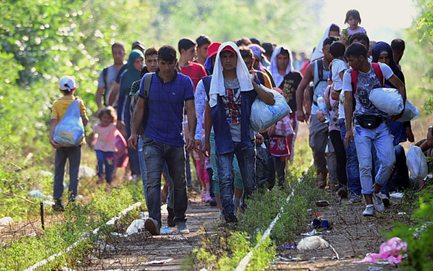How do we come to terms with or fears ?
Are our fears based on a reality which is true or one only perceived by our prejudice ?
The mass exodus of people from North Africa to Europe has created a dilemma. Do we follow our humanitarian instincts fed by the sight of the young children following in the wake of their parents. Children we understand the world over have no say in what their parents decide, they live outside the world of the adult in so far as political perspective is concerned.
For its this broad based 'political dimension' that is at the base of all our fears.
How will a large number of people with such a disparate cultural upbringing and religious observance be assimilated into our already pressured community.
The organisations that would welcome everyone would also be the first on the barricades if school places couldn't be found or hospital beds be made available, in other words they are people who have a humanitarian view that people should be accommodated, what ever the cost.
Another view is that assimilation is crucial and that to assimilate one has to have an under-standing that for people coming into a society must swear alliance to their new home and cast off the old.
The Americans insist in the swearing in ceremony that on becoming an American each new American agrees to relinquish their old citizen ship before taking on the new. It's a very specific and for some difficult moment in the ceremony but it provides an ideological break with the past as you begin to forge links with the new.
In this country there is no such moment and the incoming citizen brings with them all the baggage of the old. Some simple set up camp with their culture and religious needs and create a society within a society which attracts and grows as the numbers swell with newcomers.
We have never recognised this dilemma of separating and segmenting society, not in an official way which we pride ourself would be unethical but by allowing it to happen by natural selection.
People select what they know best. Many a small town in sunny Spain has been ruined by the imposition of the English culture and habits. If it's food, one can accept it. If it's behaviour than that becomes a different concern since the 'locals' have their own set of beliefs and cultural norms which they cherish. If it is religion then a whole new dimension is opened up which, because of its deep rooted, faith based subservience has an allegiance outside any of the local constrains set within the moral and ethical compliance which govern others.
If there is a pecking order then a 'faith based hierarchy' will always seek control. It is implicit in Gods teaching that right and wrong are bound up in the aspect of belief and non belief. This division has been the cause of so many pogroms, so many massacres down through the ages that it is one of the reasons that secularists decry faith playing a part in the organisational structure of a country.
This being an anathema to a culturally strong religious sect of people, it seems to me dangerous to substantially alter the balance in any country since no amount of reasoned debate will persuade either side. Cohabitation will eventually lead to violence. Implacable opposites become enemies, enemies destroy the fabric of a society.
Look at Northern Ireland and the hatred between Catholic and Protestant. A hatred which is between peoples who, not only follow the same Christian thread of religious teaching but have grown up culturally in the same place for generation after generation.
The concept of Multiculturalism is a long cherished ideal and under certain circumstances, seen from afar it is presumed to work but it relays on the grace of people to make it work. Often the differences which are worked through and accepted on a day to day basis only re-emphasise the deep seated differences.
Viva la difference is certainly true in our acceptance of cultural diversity between nations but within a nation it has the power to fragment and eventually disintegrate the subtle glue of acceptance which hold a society together.
Wednesday 16 September 2015
Mass immigration, good or bad.
Subscribe to:
Post Comments (Atom)

No comments:
Post a Comment